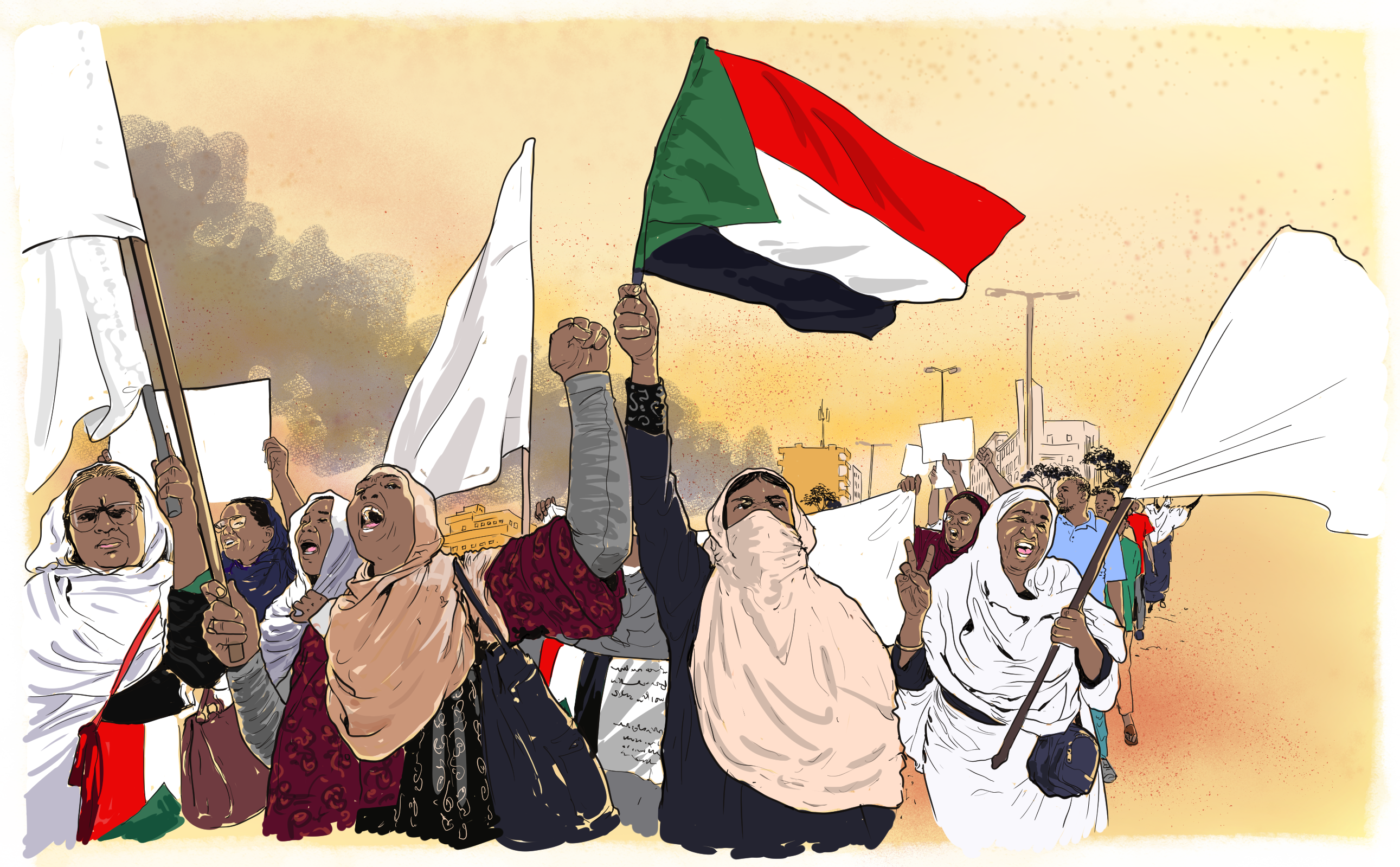In the words of Astur*: Women’s networks are working at different levels to end the war.
Date:

Astur* is a Sudanese advocate for women's rights and a writer. She has published a novel and has produced several episodes of radio dramas, all revolving around women's issues. She is one of the founders of the Women's Awareness Initiative in the Blue Nile region, which works to promote the active participation and leadership of women and girls and to oppose gender-based violence.
She leads the Feminist Alliance in the region, advocating for Security Council Resolution 1325 on women, peace and security. She is a member of various local and regional women's initiatives and networks. She is also a trainer and researcher in the fields of gender and development.
On 16 April 2023, she established the "Mothers of Sudan" campaign opposing the ongoing war in Sudan. She also organized the first women's protest against the war, held in Khartoum on 23 April.
The war’s impact on women and girls
The ongoing war in Sudan has numerous direct and indirect effects on women. In war zones, many women have been killed or injured during battles due to gunfire and shelling inside and outside their homes. They have also experienced severe sexual and non-sexual violations and exploitation by forces present in their neighbourhoods. In addition, they face insecurity, displacement, and life-threatening situations due to the lack of basic services such as water and healthcare. They suffer from psychological trauma, shock, fear, and panic, as well as loss of income. Many women have joined organized gangs engaged in looting.
Indirect effects outside war zones are that women in other areas, affected by the surrounding conditions in the country, face significant challenges. Economic pressure has led to increased sexual exploitation, engagement in more dangerous professions, begging, and the loss of family members. Many soldiers from states outside Khartoum have been killed in the battles, leaving their families under the care of women without any other source of income.
Another indirect effect is the increase in domestic and sexual violence due to the overall militarization of society. Crime rates have also risen due to unemployment and the influx of people fleeing Khartoum without adequate support. Moreover, the escape of prisoners and the lack of services have affected women's hospitals, maternity centers, and reproductive health services.
Efforts by women's groups
The war has led to increased coordination among women's groups and the creation of strong solidarity among women across all Sudanese states. Several networks are working at different levels to end the war, such as the Women Against War network and the Mothers of Sudan campaign. These groups document violations, monitor the situation, advocate for peace, and exert pressure on the international community and other parties to support a resolution and achieve peace. They also provide support to affected families, offer shelter to the displaced, facilitate the evacuation of those trapped in Khartoum and provide medical services.
“Mothers for Sudan” action priorities
The Mothers of Sudan initiative mobilizes citizens to oppose the war, exert pressure on individuals and military leaders, and contribute to resilience strategies within the current crisis. The organization initially emerged as a strong advocate for peace, but quickly transitioned to conducting a comprehensive situation analysis. Recognizing the importance of engaging civil society, they actively sought ways to involve them in the progress towards resolving the situation. In addition to their analysis, they have devoted efforts to creating diverse strategies for various involvements, while also providing vital psychosocial support for survivors.
The Mothers of Sudan group has now evolved into a platform primarily focused on sharing information. Given the urgency and severity of the circumstances, their primary goal has shifted to saving lives, making it challenging for them to fully reorganize and operate at their maximum capacity. Nonetheless, their commitment to their cause remains unwavering as they strive to make a difference in the lives of those affected
The “Mothers for Sudan” action priorities include:
- International pressure on parties to end the war.
- International pressure on parties to stop violations against civilians.
- Providing urgent aid to internally displaced people in affected areas.
- Supporting women's efforts, solidarity networks, and initiatives, ensuring their active participation in peacebuilding and negotiation, and monitoring the implementation.
- Documenting all violations to ensure that the perpetrators face fair trials.
- Supporting protection and immediate assistance for non-displaced individuals, especially women who have lost their income and are burdened with additional responsibilities.
- Conducting studies and surveys to assess the short- and long-term economic and social impacts on women.
- Supporting efforts to restore the democratic path and ensuring that the military does not retain power after the war ends.
- Developing and adopting urgent resilience plans for affected communities and vulnerable segments in indirectly affected societies to mitigate the impact.
- Providing psychological support and direct assistance to survivors of sexual and other violations.
These actions will be coordinated through the “Peace for Sudan” platform. The “Peace for Sudan” platform’s priorities include coordinating efforts and advocating for women's issues during the ongoing war, ensuring protection for women in war-affected areas, amplifying women's voices in international, regional, and local communities, and pressuring for women's inclusion in all peace processes.
Astur* and other activists who are a part of the “Peace for Sudan” platform, supported by UN Women Sudan, are calling for an end to the conflict in Sudan and promoting women’s role in peace processes and working towards a sustainable Sudan. The work of these women is in line with SDG goal 16 on peace, justice and strong institutions.
The views expressed in this article are those of the author and may not necessarily reflect those of UN Women.
*Name changed to protect her privacy